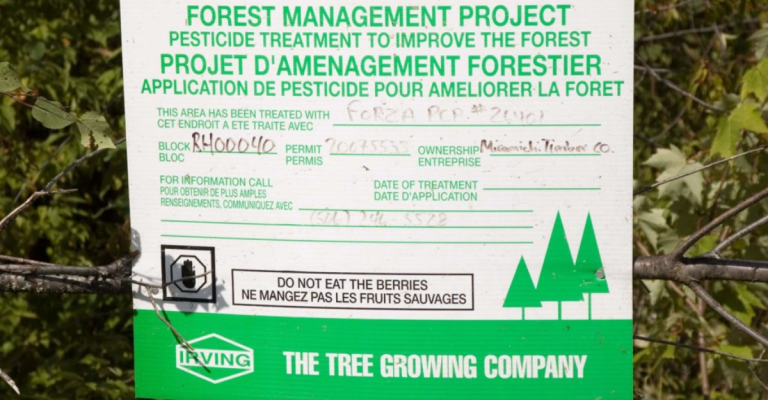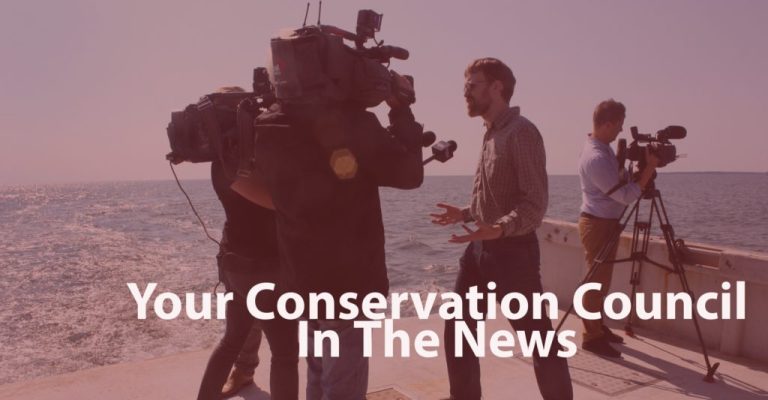
In this edition of EcoNews, we bring you a story hot off the press: the neurologist who first sounded the alarm on an unidentified brain disease in N.B. is urging the federal government to investigate a connection to glyphosate; we bring you the latest in J.D. Irving Ltd.’s pulp mill pollution saga; we invite artists with a passion for climate action to join the next cohort of our Harm to Harmony collective; we share our recommendations to government on a new tool to help protect ocean habitat and wildlife; and, we bring you up to speed on a busy few weeks of affordable electricity advocacy, including our takeaways from the recent energy board hearings, the small modular nuclear reactor hearings, and our very own citizens’ assembly.

Investigate glyphosate connection to unidentified brain disease: Neurologist
In a letter to top public health officials in New Brunswick and the federal government, neurologist Alier Marrero said many of his patients, some of whom have been suffering from an unknown brain disease since the early 2010s, showed “clear signs of exposure” to glyphosate “many times over the detection limit.” According to a report from N.B.’s chief medical officer of health, New Brunswick forestry companies spray more glyphosate per hectare of harvested forest than any province in Canada.

Billionaire Irvings get help from feds to make good on promised pollution fix
Our Fundy Baykeeper is questioning why the billionaire James Irving’s pulp and paper company needs a $100 million loan from the federal government to build a waste treatment facility it promised as part of its punishment for illegally polluting the St. John River for years.

Energy board hearings demonstrate need for radical reform
Two weeks of Energy and Utilities Board hearings has made one thing abundantly clear to our climate solutions team: the way we make energy—and the way we make decisions about energy—has to change. Dr. Louise Comeau shares her takeaways and recommendations on how to give New Brunswickers more say about what happens to NB Power and the kind of electricity system citizens are willing to pay for.

Baykeeper submits recommendations on new tool to protect ocean habitat, wildlife
Ensure Indigenous co-governance from the outset, give citizens and organizations the opportunity to nominate waters important to them and the environment, and halt any habitat-damaging activities once an area has been selected for designation—these are our Fundy Baykeeper’s top recommendations for a new federal government tool that, if done right, will help fill important gaps in ocean protection.

Affordable electricity is a necessity of modern society: Citizens assembly
This past weekend, we brought together a small group of New Brunswickers with different perspectives for a deep dive into the province’s electricity landscape, tasking them with identifying the principles, policies and programs that would improve household energy efficiency, reduce household energy costs and address energy poverty. The result is a citizens’ statement that envisions an electricity system built on transparency, accountability and trust.

'You better work on your plan B'
Experts, Indigenous leaders, citizens group and environmental organizations including the Conservation Council told MLAs investigating small modular nuclear reactors that the technology—which has never been scaled successfully at a commercial level—is too risky, too expensive, and too far away from a viable product to be considered an option for decarbonizing New Brunswick’s electricity grid and meeting emission reduction targets by the end of the decade.

Call for artists: Join our Harm to Harmony community
Are you interested in leading a values-driven group of creative activists to explore how art can impact social change around clean energy, energy affordability and energy poverty? Are you a New Brunswick-based community-engaged artist or artist team, passionate about climate justice, who would benefit from being mentored by a senior community-engaged artist? If so, we invite you to contribute your passions and talents to our latest Harm to Harmony community art collaboration.

We work hard to ensure a strong environmental voice is heard in the New Brunswick print, radio and television media. Here are the latest stories Conservation Council staff have been called upon for expertise, analysis and commentary.
March 2, 2023 — Louise Comeau, director of climate solutions, is quoted in a The Hill Times article about the standing committee on climate change and environmental stewardship’s recent hearings into the role small modular nuclear reactors should play in New Brunswick’s energy future. Read the story.
March 1, 2023 — Matt Abbott, Fundy Baykeeper and director of marine conservation, speaks with the National Observer about J.D. Irving receiving a federal loan to help build a pollution treatment facility it promised to construct after illegal dumping in the St. John River. Read the story.
March 1, 2023 — Comeau’s op-ed on the need for a clean electricity strategy following the Energy and Utilities Board hearings is published in the New Brunswick Telegraph-Journal. Read the commentary.
Feb. 24, 2023 — Comeau speaks with the New Brunswick Telegraph-Journal about energy poverty during the EUB hearings into NB Power’s proposed rate increase. Read the story here.
Feb. 15, 2023 — Abbott speaks with Huddle Today about ongoing efforts from industry and government to export liquefied natural gas from Saint John. Read the story.
Feb. 9, 2023 — Abbott speaks with Global New Brunswick about ongoing efforts from industry and government to export liquefied natural gas from Saint John. Read the story.
Feb. 7, 2023 — Moe Qureshi, manager of climate campaigns and policy, speaks with CBC Maritime Noon, and fields questions from callers, about biomass. Listen to the segment here.
Feb. 6, 2023 — Comeau speaks with CBC Newfoundland & Labrador’s The Signal about our research into community acceptance of wind energy projects. Listen to the interview here.
Recent press releases we’ve issued include:
Feb. 16, 2023 — Comeau: Carbon tax changes should not affect programs that help citizens use less energy
Feb. 15, 2023 — N.B. needs electricity reform—not political pressure to invest in unproven SMRs
Feb. 8, 2023 — LNG export, shale gas, not worth risk posed to water, air and climate
